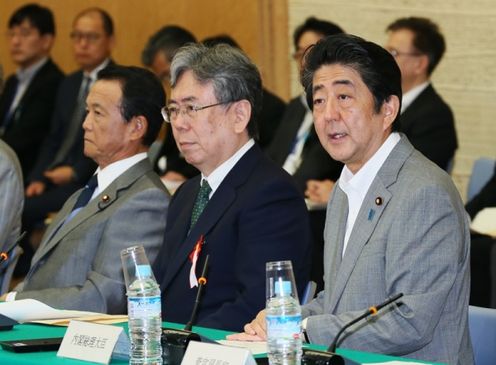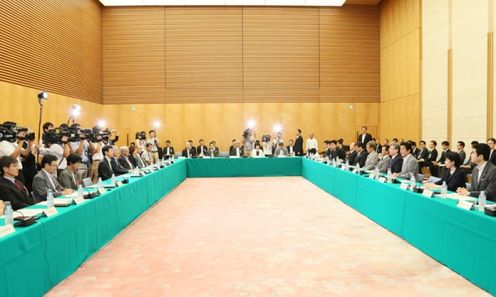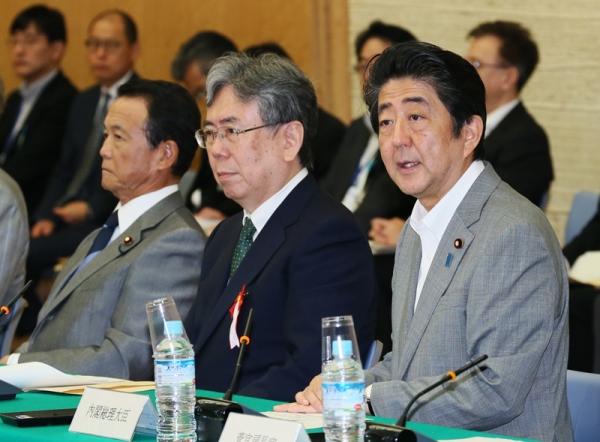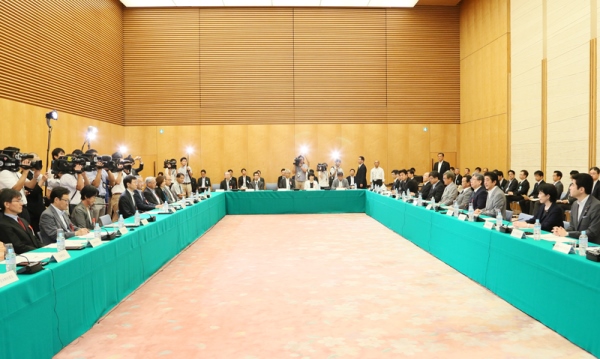Home > News > The Prime Minister in Action > September 2016 > Government Tax Commission
The Prime Minister in Action
Government Tax Commission
September 9, 2016

Photograph of the Prime Minister making a statement (1)

Photograph of the Prime Minister making a statement (2)
[Provisional Translation]
Prime Minister Shinzo Abe held the first meeting of the Government Tax Commission at the Prime Minister's Office.
During the meeting, following the election of a meeting Chair and the confirmation of meeting rules, discussions were held on the initiatives of the Government Tax Commission thus far.
Based on the discussion, the Prime Minister said,
“I would like to say a few words on the opening of the first meeting of the Government Tax Commission.
I want to express my sincere gratitude to everyone in attendance today for quickly agreeing to again take up your duties as members of the Government Tax Commission.
As the Government Tax Commission, you have up to this point organized the basic thoughts on the state of corporate tax reform and international tax systems. I hope that you will continue to have mid- to long-term discussions from a wide range of perspectives on the many tax system issues we face, based on the consultations that have been held so far.
The issue of greatest priority for the Abe Cabinet continues to be the economy. In order to completely exit deflation, realize mid- to long-term economic growth, and overcome issues associated with being a society with an aging population and a falling birthrate, we must decisively carry out structural reforms and make full use of the latent capabilities of the Japanese economy. The greatest challenge we face if we are to realize all of that is work style reform, and the Cabinet is resolved to tackle this issue as a single entity.
It is necessary to constantly discuss the state of tax systems and social security systems, as they respond to socioeconomic structural changes. In the last quarter century, our economy and society have seen major structural changes, including changes to our population demographics, our families, and our work styles. As stated in the Basic Policies for Economic and Fiscal Management and Reform, there is a need now for structural reform on personal income tax as well, based on the changes that I mentioned.
In particular, we need to create neutral frameworks for a variety of working styles, in order to make such things possible as allowing women to work without feeling conscious about their work style. It is also important to shine a light on the younger generation and aim for a tax system that makes it possible for people to have peace of mind about getting married, as well as giving birth and raising children.
It is crucial that we enable people to make further use of their capabilities through the promotion of personal income tax reform alongside work style reform. I believe that doing that will facilitate efforts to make full use of the latent capabilities of the Japanese economy.
Based on the points for debate that you have compiled in consideration of the discussions had thus far, I would like the members of this Commission to move forward with deliberation toward concrete measures for these initiatives.
Also, given rising public interest in the problem of tax evasion in the wake of the publication of the Panama Papers, it was confirmed at the G20 Hangzhou Summit the other day that we will cooperate internationally and participate in the base erosion and profit shifting (BEPS) project. I would like the members of this Committee to advance consideration and discussions on the steady execution of this project as well.
Lastly, because taxation is the very manifestation of democracy, our decisions on this issue must take into account the various opinions of the public. There is a need for expert discussion to be carried out from a variety of perspectives based on the three principles of 'fairness, neutrality, and simplicity.' I would like to conclude my remarks by asking Chair Nakazato and the Commission members to carry out extensive deliberations. Thank you for your cooperation.”


